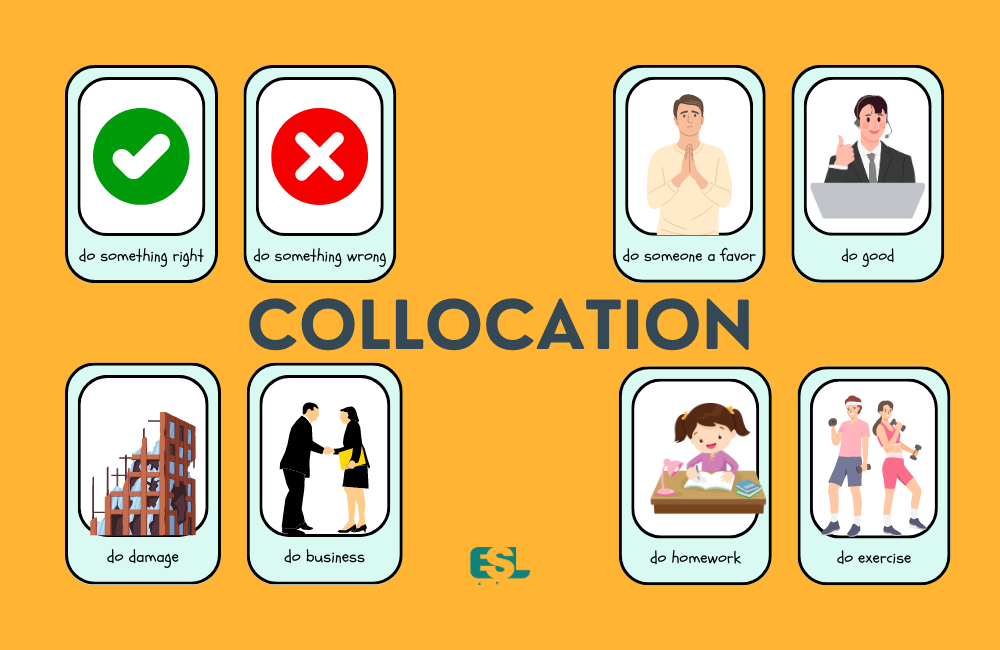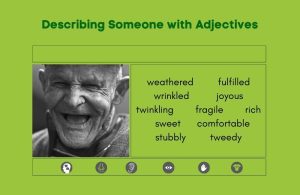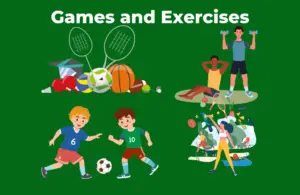This article covers the following areas –
- What Is a Collocation?
- Why Are Collocations Important?
- 50 Common English Collocations With Meaning & Example Sentences
- Tips to Master Collocations
- Final Words
Hey there, fellow word enthusiast! I remember the days when I’d trip over my words, trying to sound smart but ending up sounding, well, a bit awkward. Can you relate? Thankfully, I stumbled upon the magic of collocations, which made all the difference. So, if you want to enrich your vocabulary and sound more natural, this guide is for you. Let’s dive in!
Collocation refers to the habitual juxtaposition of words that typically occur together in a language. To master collocations, one should actively listen, read regularly, practice using them, and engage in conversations with native speakers. Regular exposure and repetition are key.
If you are searching for an effective English language vocabulary builder, try Word Power Made Easy: The Complete Handbook for Building a Superior Vocabulary (Amazon Link). This time-tested classic has helped millions achieve mastery of English and improve their communication skills in business, the classroom, and in life.
Continue reading for a deeper dive into the world of collocations and to equip yourself with practical tips, insightful examples, and effective strategies. This comprehensive guide is tailored to enhance your linguistic prowess and fluency.
What Is a Collocation?
Do you know how certain things in life seem to belong together? Think about it – Batman and Robin, Netflix and chill, mornings and coffee. These pairings feel natural to us, just right. It’s like there’s an invisible string tying them together. What if I told you that the world of language has its own set of inseparable partners? Enter the world of collocations!
A collocation is a combination of words frequently appearing together, exhibiting a natural co-occurrence in language. These pairs or groups of words, such as ‘heavy rain’ or ‘make a decision,’ are used by native speakers for precise, fluent expression. Understanding collocations enhances linguistic proficiency and comprehension.
Collocations are to language what peanut butter is to jelly. They’re the duo that gives depth and authenticity to our conversations. They help our words not just to sound right but feel right. And if you’ve ever found yourself in a situation where you used a technically correct word pairing but got puzzled looks anyway, chances are you stumbled upon the reason why understanding collocations is crucial.
Ready to dive into this fascinating aspect of language? Let’s uncover the magic behind these unique word combinations.
You’ve probably guessed by now, but to lay it out in simple terms, collocations are words that frequently go together. They’re like that dynamic duo I discussed earlier – peanut butter and jelly. You could be adventurous and slap some peanut butter with pickles, but most people would scrunch their nose at that combo.
The same goes for phrases like “make a decision.” It just rolls off the tongue better than “do a decision.” It’s not so much about following grammar’s strict playbook; it’s more about what sounds familiar and right based on the countless times we’ve heard these words paired together.
Why Are Collocations Important?
Imagine this: you’re putting together an outfit for a special occasion. You could wear those bright yellow shorts with a polka-dot tie and mismatched socks. Technically, they’re all clothing items. But would they harmonize and make you look dapper? Probably not. In the world of language, collocations are our fashion-matching guide. They help us pick out words that look and sound fabulous together, ensuring our conversations are both fluent and stylish.
Collocations are crucial for language proficiency, enhancing naturalness and fluency in speech and writing. They help understand nuanced meanings, improve comprehension, and facilitate effective communication. Mastery of collocations is key to sounding like a native speaker.
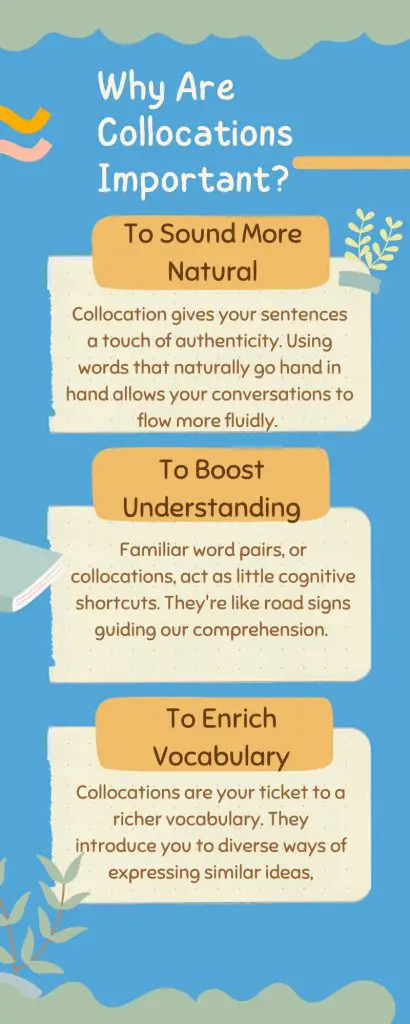
If you’ve ever wondered why some word pairings just “fit” while others seem “off,” you’ll understand the importance of collocations. Let’s get into the nitty-gritty of why these word partners are the unsung heroes of eloquent communication!
You might think, “Why the fuss over which words go together? Isn’t communication all about being understood?” Well, yes and no. While the primary goal is understanding, how we come across makes a massive difference. Let’s explore the significance of collocations in our daily conversations.
1. To Sound More Natural
Think back to the last time you learned a new language or even a new phrase. Did it sound a bit…robotic? That’s where collocations swoop in to save the day. They give your sentences a touch of authenticity. Using words that naturally go hand in hand allows your conversations to flow more fluidly. It’s the difference between sounding like you’re reading off a script and chatting casually with a friend.
Mastering collocations is essential for sounding natural in a language. It allows speakers to use correct word combinations, mimicking native fluency and enhancing conversational and written eloquence.
For example, Saying “do a mistake” might get your point across, but “make a mistake” is what most native speakers would naturally say. Spot the difference?
2. To Boost Understanding
Imagine reading a book and stumbling upon a weird word combo. It slows you down, right? Familiar word pairs, or collocations, act as little cognitive shortcuts. They’re like road signs guiding our comprehension. When we encounter well-known word combinations, our brains don’t need to work overtime. We instantly grasp the meaning.
Collocations boost linguistic understanding by familiarizing learners with common word pairings, aiding in quicker comprehension and interpretation of nuances in different contexts.
Quick Tip: Want to test this out? Try reading a paragraph full of odd word combinations and then one with standard collocations. Notice the difference in comprehension speed?
3. To Enrich Vocabulary
Let’s be honest; nobody likes sounding like a broken record. Repetition can be dull. Collocations are your ticket to a richer vocabulary. They introduce you to diverse ways of expressing similar ideas, making your language vibrant and more nuanced.
Collocations enrich vocabulary by broadening the range of expressions available, enabling more precise and varied communication. They are fundamental in transitioning from basic to advanced language proficiency.
Consider: Instead of always saying “very good,” why not try “highly beneficial” or “extremely useful” depending on the context? Variety is, after all, the spice of life (and language)!
Collocations are more than just word pairs; they’re the essence of fluent, natural communication. They’re those cozy, well-worn paths our words love to tread. Embracing them is like giving your language a makeover – more stylish, more efficient, and definitely more captivating. So, the next time you’re about to pair up words, think of collocations as your personal word stylists, ensuring you’re always at the top of your linguistic game!
50 Common English Collocations With Meaning & Example Sentences
Imagine you’re in a kitchen, playing around with ingredients. Some combos sing together, like tomato and basil, while others… well, let’s say they’re an acquired taste. The world of language isn’t all that different! Some words pair up to make delightful, memorable phrases that stick in our minds and roll off our tongues. These, my friend, are collocations.

Collocations are the superstar duos of the English language, the words that have joined forces repeatedly until they feel “right” together. And knowing them? That’s like having the secret recipe to sounding like a native speaker. Before diving into this linguistic feast, let’s whet our appetites with some classic collocations that you’ve probably heard or used but might not have recognized. Ready to spice up your vocabulary?
You already have a taste above, but let’s dig deeper. Here’s an array of common collocations to make your language flavorful:
- Bitterly cold: Extremely cold weather.
Example sentence: It was bitterly cold when I stepped outside this morning. - Broad daylight: Fully lit, often unexpectedly so.
Example sentence: The theft happened in broad daylight on the main street. - Deep in thought: Very focused on thinking or contemplating.
Example sentence: He didn’t hear the doorbell because he thought deeply. - Blazing sun: Intense and hot sunshine.
Example sentence: They hiked for hours under the blazing sun. - Close call: A narrowly avoided accident or mishap.
Example sentence: The cyclist had a close call with a speeding car. - Break a habit: To quit a regular behavior or routine.
Example sentence: It’s tough, but I’m trying to break the habit of smoking. - Catch someone’s attention: To grab someone’s interest or focus.
Example sentence: The sudden movement in the corner of the room caught her attention. - Flat broke: Having no money.
Example sentence: After buying all my textbooks, I’m flat broke. - Full of beans: Energetic and lively.
Example sentence: Even after a long day, the kids are still full of beans. - Cry over spilled milk: Wasting time being upset over past events.
Example sentence: There’s no point crying over spilled milk; we must focus on the future. - Jump to conclusions: Deciding without having all the facts.
Example sentence: Don’t jump to conclusions before hearing her side of the story. - Keep an eye on: Watch or monitor something or someone.
Example sentence: Can you keep an eye on the soup while I answer the door? - Lose track of time: Forget the current time because you’re engrossed in something.
Example sentence: I was reading and completely lost track of time. - Miss the boat: Lose an opportunity.
Example sentence: If we don’t act fast, we might miss the boat on this deal. - On thin ice: In a precarious or risky situation.
Example sentence: Continually coming late to meetings means you’re skating on thin ice. - Piece of cake: Something very easy.
Example sentence: The test was a piece of cake for her. - Sit tight: Wait patiently. Example sentence: I know you’re eager, but sit tight, and your turn will come.
- Strong coffee: Very potent coffee.
Example sentence: I need a strong coffee to wake me up today. - Throw in the towel: Give up.
Example sentence: After hours of trying, he threw in the towel and called for help. - Under the weather: Feeling ill.
Example sentence: I think I’ll stay in today; I feel under the weather. - Waste of time: A futile activity.
Example sentence: Arguing with him is a waste of time; he never changes his mind. - Break the ice: Start a conversation to dispel awkwardness.
Example sentence: She told a joke to break the ice at the beginning of the presentation. - Call it a day: Stop working for the day.
Example sentence: It’s getting late; let’s call it a day. - Cut corners: Take shortcuts, often at the expense of quality.
Example sentence: If we cut corners on this project, it might affect the final product. - Get the ball rolling: Start a process or an activity.
Example sentence: Let’s get the ball rolling by brainstorming some ideas. - Hit the books: Start studying.
Example sentence: I have exams next week, so I need to hit the books. - In the nick of time: Just at the last possible moment.
Example sentence: He managed to catch the bus in the nick of time. - Last straw: The final problem or inconvenience that causes one to lose patience.
Example sentence: Forgetting our anniversary was the last straw; I can’t be with him anymore. - Make up your mind: Make a decision.
Example sentence: We don’t have all day. Can you make up your mind? - Out of the blue: Unexpectedly.
Example sentence: After years of silence, she called me out of the blue. - Read between the lines: To understand a deeper or hidden meaning in something said or written.
Example sentence: The letter seemed cheerful, but reading between the lines, you could sense her loneliness. - See eye to eye: To agree on something.
Example sentence: We don’t always see eye to eye but respect each other’s opinions. - Take it easy: Relax or calm down.
Example sentence: You’ve been working hard all week; take it easy this weekend. - Up in the air: Uncertain or unsure about something.
Example sentence: Our holiday plans are still up in the air due to the unpredictable weather. - Walk on eggshells: Be extremely cautious about one’s words or actions.
Example sentence: After the argument, I felt like I had to walk on eggshells around him. - Bite the bullet: Face a difficult situation head-on.
Example sentence: I really didn’t want to see the dentist, but I knew I had to bite the bullet. - Cost an arm and a leg: Very expensive. Example sentence: That handbag must have cost her an arm and a leg.
- Draw the line: Set a clear boundary about what is acceptable.
Example sentence: I can tolerate a lot, but I draw the line at dishonesty. - Hit the nail on the head: Describe exactly what is causing a situation or problem.
Example sentence: When she said I was avoiding the issue, she hit the nail on the head. - In hot water: In trouble.
Example sentence: If you don’t finish that report on time, you’ll be in hot water with the boss. - Jump the gun: Act before the appropriate or opportune time.
Example sentence: I think he jumped the gun by announcing it before the deal was finalized. - Kill two birds with one stone: Achieving two objectives with a single action.
Example sentence: I killed two birds with one stone by going to the post office on my way to the supermarket. - Let the cat out of the bag: Reveal a secret.
Example sentence: He accidentally let the cat out of the bag about their surprise party. - Once in a blue moon: Very rarely.
Example sentence: She visits that part of the town once in a blue moon. - Pull someone’s leg: Joking or teasing someone.
Example sentence: I’m just pulling your leg; I remember our anniversary. - Running out of steam: Losing energy or enthusiasm during an activity. Example sentence: I started cleaning the garage but ran out of steam halfway through.
- Steal the show: Attract all the attention. Example sentence: Her stunning performance stole the show.
- Take with a grain of salt: Not taking something too seriously or skeptically. Example sentence: I’d take his advice with a grain of salt; he’s not exactly an expert.
- Through thick and thin: In both good and bad times. Example sentence: We’ve been best friends for 20 years, supporting each other through thick and thin.
- Burning the midnight oil: Working late into the night. Example sentence: I had to burn the midnight oil to finish the project on time.
To elevate your vocabulary in just 30 days, I recommend an informative, fun, and accessible guide to utilizing powerful language to my students. Millions of individuals have enhanced their academics, job skills, and confidence by dedicating just fifteen minutes daily to the exercises and tests of 30 Days to a More Powerful Vocabulary (Amazon Link), a top-selling. It offers step-by-step methods to bolster language prowess, discover compelling words, and daily vocabulary enhancement with pronunciation guidance.
Tips to Master Collocations
Okay, so you’ve grasped what collocations are and why they’re the peanut butter to our conversational jelly (see what I did there?). But now comes the golden question: How do you get these excellent word pairs to roll off your tongue like a native speaker? It’s one thing to recognize them, but another ball game to use them effortlessly. Well, fear not! I’ve got some tried and tested tricks up my sleeve to help you master the art of collocations.
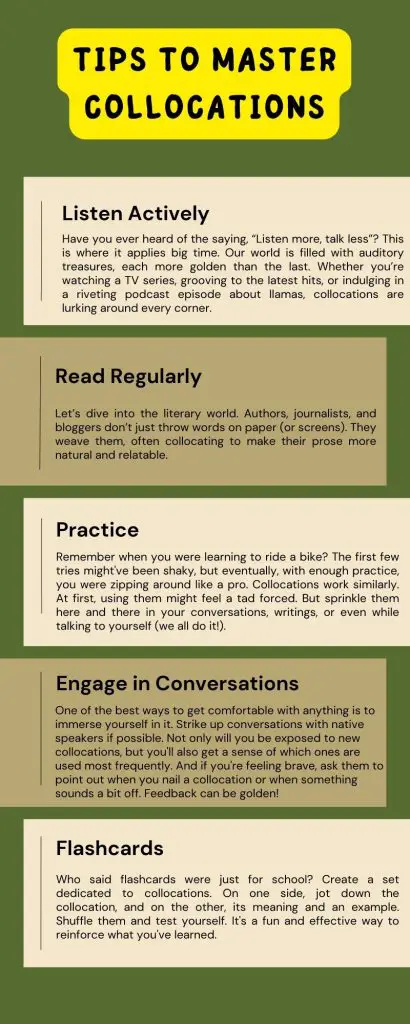
1. Listen Actively
Have you ever heard of the saying, “Listen more, talk less”? This is where it applies big time. Our world is filled with auditory treasures, each more golden than the last. Whether you’re watching a TV series, grooving to the latest hits, or indulging in a riveting podcast episode about llamas, collocations are lurking around every corner.
Example: You’re watching a rom-com, and the lead says, “I’ve fallen head over heels for him.” There you go! That’s a collocation.
The key is to tune in and catch these gems. When you hear a phrase that sounds harmonious and fits, chances are, it’s a collocation. Make a note of it. Create a list. Before you know it, you’ll have a collection to sprinkle into your chats.
2. Read Regularly
Let’s dive into the literary world. Authors, journalists, and bloggers don’t just throw words on paper (or screens). They weave them, often collocating to make their prose more natural and relatable.
When you’re reading and stumble upon a phrase that seems familiar yet impactful, highlight it. Maybe you read in a magazine, “The company took drastic measures to tackle the issue.” There’s another collocation for you!
Dedicate a notebook for these collocational finds, or use sticky notes. Over time, not only will your vocabulary be enriched, but you’ll also get an intuitive feel for which words naturally buddy up.
3. Practice
Remember when you were learning to ride a bike? The first few tries might’ve been shaky, but eventually, with enough practice, you were zipping around like a pro. Collocations work similarly. At first, using them might feel a tad forced. But sprinkle them here and there in your conversations, writings, or even while talking to yourself (we all do it!).
For instance, instead of saying, “It’s cold,” on a chilly day, try, “It’s bitterly cold.” Or if you’ve had a close encounter with missing a bus, say, “That was a close call.” The more you play around with them, the more ingrained they become.
4. Engage in Conversations
One of the best ways to get comfortable with anything is to immerse yourself in it. Strike up conversations with native speakers if possible. Not only will you be exposed to new collocations, but you’ll also get a sense of which ones are used most frequently. And if you’re feeling brave, ask them to point out when you nail a collocation or when something sounds a bit off. Feedback can be golden!
5. Flashcards
Who said flashcards were just for school? Create a set dedicated to collocations. On one side, jot down the collocation, and on the other, its meaning and an example. Shuffle them and test yourself. It’s a fun and effective way to reinforce what you’ve learned.
By following these tips, collocations will soon fall into your daily language naturally and effortlessly. Embrace the journey, enjoy the learning process, and remember, every great conversationalist started somewhere!
Final Words
Collocations, the subtle pairings within our language, bring depth, authenticity, and a touch of nativeness to our conversations. The unsung heroes make our sentences resonate and feel just right.
By understanding their essence and employing the strategies laid out in this guide, you not only elevate your linguistic skills but also bridge the gap between basic comprehension and true fluency. As with any skill, mastering collocations demands dedication, practice, and immersion.
But with every effort, you edge closer to sounding like a native, making every conversation richer and more engaging. So, keep listening, keep reading, and let the magic of language unfold.

